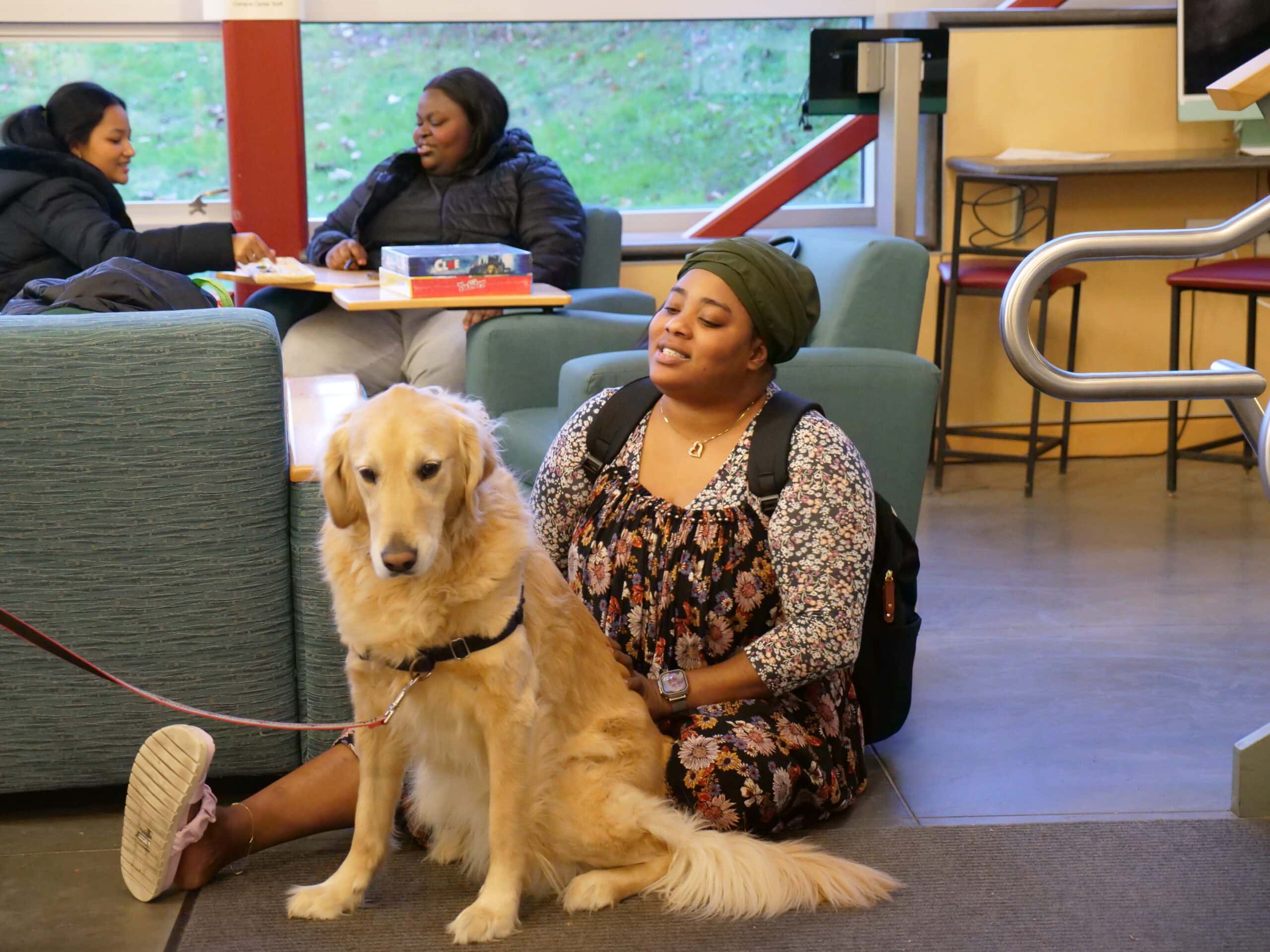At Vermont State University, we truly value inclusivity and understand the significance of ensuring that every student can fully engage in our housing program. This includes accommodations for emotional support animals and service dogs in accordance with the Fair Housing Act. Learn more about our procedures and frequently asked questions about support animals.
What is the Procedure for Requesting a Support Animal Accommodation?
If you would like to request an Emotional Support Animal (ESA), you can have your health care provider complete the Vermont State University ESA Form to request an Emotional Support Animal as a disability accommodation. In accordance with the Fair Housing Act, which provides for assistance dogs for persons with disabilities, emotional support animals (ESA) may be allowed in a residence hall, in certain cases, if the following qualifications are met:
- The individual resident making the request has a documented mental health condition that is substantially limiting and thus rises to the level of being a disability;
- The animal is necessary to afford the individual with a disability an equal opportunity to use and enjoy campus housing;
- There is an identifiable relationship between the disability and the assistance the animal provides;
- There is a relationship of sufficient length and robustness between the individual and the mental health provider to allow the provider to make a credible recommendation regarding the request.
Does the University Allow Pets?
The university enforces a “no pets” policy. Animals may not be brought into the residence hall until you have submitted reliable documentation, and the accommodation has been approved by Disability Services.
If an ESA is allowed, the following policies shall be enforced:
- The university is not responsible for the care or supervision of the ESA.
- The specific animal to be an ESA will be approved by Residence Life.
- The ESA must be under the control of its owner at all times.
- The ESA must be appropriately restrained when the student is not in the room.
- The owner must show proof that all vaccines, if required, are up to date as appropriate.
- The ESA is only allowed in the individual residence to which the individual with a disability is assigned by Residence Life.
- The appropriate forms (Housing Service Dog and Emotional Support Dog Agreement Form) must be submitted to Residence Life.
Service Dogs
Definition
The Americans with Disabilities Act (ADA) defines service dogs as “dogs that are individually trained to do work or perform tasks for people with disabilities. Examples of such work or tasks include guiding people who are blind, alerting people who are deaf, pulling a wheelchair, alerting and protecting a person who is having a seizure, reminding a person with mental illness to take prescribed medications, calming a person with Post Traumatic Stress Disorder (PTSD) during an anxiety attack, or performing other duties. Service dogs are working dogs, not pets. The work or tasks a dog has been trained to provide must be directly related to the person’s disability.” A service dog can be any breed or size. It might wear specialized equipment; such as a backpack, harness, or special collar or leash, but this is not a legal requirement. If a dog meets this definition, it is considered a service dog regardless of whether it has been licensed or certified by a state or local government or a training program.
The ADA further states that “dogs whose sole function is to provide comfort or emotional support do not qualify as service dogs under the ADA.”
The ADA allows service dogs accompanying persons with disabilities to be anywhere that is open to the public on university premises. University premises shall mean any land and/or facility owned, leased, rented, and/or occupied by Vermont State University. There may be individual exceptions in places where the presence of the service dog may compromise safety or a sterile environment and/or interfere with the fundamental nature of the activities being conducted in which the service dog would be not permitted.
Service Dog FAQ
Linked Documents:
Contact Us
DisabilityServices@VermontState.edu
Castleton and Killington
Gerry Volpe
Director of Disability Services
Vermont State University, Castleton
87 University Drive
Castleton, VT 05735
Phone: 802.468.1428
Fax: 802.468.1205
Gerard.Volpe@VermontState.edu
Schedule a meeting!
Johnson and Online Students
Pamela Billings, M.A., CCC-SLP
Coordinator of Disability Services
Vermont State University, Johnson
337 College Hill Road
Johnson, VT 05656
Phone: 802.635.1214
Fax 802.635.1454
Pamela.Billings@VermontState.edu
Schedule a meeting!
Lyndon
Aimee Rozum
Coordinator of Disability Services
Vermont State University, Lyndon
1001 College Road
Lyndonville, VT 05851
Phone: 802.626.6438
Fax: 802.626.6474
Aimee.Rozum@VermontState.edu
Randolph, Williston, Dental Hygiene Online, Nurse Re-entry, ADN, PN, & Online BSN Programs
Disability Services Team
DisabilityServices@VermontState.edu





